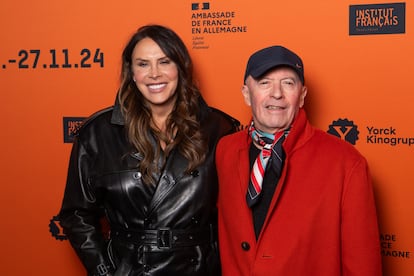Jacques Audiard, director of ‘Emilia Pérez’, distances himself from Karla Sofía Gascón: ‘What she said is inexcusable’
The French filmmaker admits his trust in the actress is broken after her past racist and xenophobic tweets resurfaced


Reactions continue to emerge in response to Karla Sofía Gascón’s racist and xenophobic tweets, which were leaked in late January, as well as to her handling of the controversy. The Emilia Pérez star has apologized but maintains that she is the target of a hate campaign to damage her reputation.
On Wednesday, Jacques Audiard, 72, the director of Emilia Pérez, finally broke his silence. While he had attended some events related to the film, he had not publicly addressed the controversy surrounding his lead actress — an unfolding scandal that could significantly impact the film’s chances in the Academy Awards. Emilia Pérez is nominated for 13 Oscars, but it remains unclear how Gascón’s past remarks might affect the movie’s odds.
Audiard appears deeply unsettled by the situation and shows no inclination to support or defend his lead actress. In an interview with the film industry outlet Deadline, he addresses the issue head-on. When asked how recent events have altered the perception of the film, he clarifies: “You specifically are talking about Karla Sofía and all that stuff?”
When the interviewer confirms, noting how Gascón’s past statements have overtaken the awards conversation, Audiard responds: “Yes. Very unfortunately, it is taking up all the space, and that makes me very sad. It’s very hard for me to think back to the work I did with Karla Sofía. The trust we shared, the exceptional atmosphere that we had on the set that was indeed based on trust. And when you have that kind of relationship and suddenly you read something that that person has said, things that are absolutely hateful and worthy of being hated, of course that relationship is affected. It’s as if you fall into a hole. Because what Karla Sofía said is inexcusable.”
“I haven’t spoken to her, and I don’t want to,” he continues. “She is in a self-destructive approach that I can’t interfere in, and I really don’t understand why she’s continuing. Why is she harming herself? Why? I don’t understand it, and what I don’t understand about this too is why she’s harming people who were very close to her. I’m thinking in this thing of how hurting others, of how she’s hurting the crew and all these people who worked so incredibly hard on this film. I’m thinking of myself, I’m thinking of Zoe [Saldaña] and Selena [Gomez]. I just don’t understand why she’s continuing to harm us.”
After that pointed remark, the journalist responds: “That sentiment,” referring to reflection, “seems to be missing in her fusillade of comments and interviews. Sometimes you just apologize and own that what you’ve said was wrongheaded. We haven’t really seen that.”
Audiard replies: “Absolutely not. She’s really playing the victim. She’s talking about herself as a victim, which is surprising. It’s as if she thought that words don’t hurt.”
The French filmmaker — who also directed The Sisters Brothers and A Prophet — confirms that he will continue participating in the awards season but admits that “for the moment there’s something sad about it.” He elaborates: “I thought I was coming back here [to Hollywood] full of enthusiasm and now there’s a sadness that we have to get past, if things aren’t clear, then we need to shed light on them and we’re going to have to spend time on continuing to really defend this film.”
He also highlights a key concern: Zoë Saldaña. “I’m not alone in this business. There’s Zoe. I want to and I’m going to champion and defend her. I would never let her go. There’s my extraordinary crew that worked on this film, with faith and enthusiasm. There’s no way I’m letting go of these people.”

Saldaña had been the frontrunner for the Oscar for Best Supporting Actress, for her role as the lawyer Rita in Emilia Pérez. Before the controversy surrounding the film erupted, both bookmakers and critics overwhelmingly predicted her as the clear winner in the category. While she remains a strong contender, her lead has diminished, with Ariana Grande (Wicked), Felicity Jones (The Brutalist), Isabella Rossellini (Conclave), and Monica Barbaro (A Complete Unknown) closing in.
Addressing the situation during a panel about the film last Friday, Saldaña said she was “processing everything” and felt “very sad” about the situation. “I don’t have any tolerance for any negative rhetoric towards people of any group,” she added. “I can only attest to the experience that I had with each and every individual that was a part, that is a part, of this film, and my experience and my interactions with them was about inclusivity and collaboration and racial, cultural, and gender equity.”
For now, Gascón has given several interviews addressing the controversy, making it clear that he has no intention of stepping out of the Oscar race voluntarily. “I cannot step down from an Oscar nomination because I have not committed any crime nor have I harmed anyone,” she said in her first interview since the crisis began, speaking to CNN. “I am neither racist nor anything that all these people have tried to make others believe I am.
In an interview with EL PAÍS, Gascón said she has been left “very alone.” “I will never regret not agreeing with women being forced to wear a burqa; I will never allow a Catholic to tell me that I am the work of the devil,” she continued. “I do not want wars in this world, I do not belong to any political party and I will point out what I don’t like about all of them, I am against dictatorships, fanaticism, how sheepish we are, aggressive demonstrations, sexism. I am in favor of inclusion, of positive discrimination, because I ended up understanding it, of the rights of women, of workers, of immigrants, because I am one, of sexual and artistic freedom, of humor, of irony, of paraphrasing haters to expose them. I do not agree with the lynching, trials, and convictions of bots and haters on social media. The worst thing is that any way is okay to keep insulting me, but nobody cares about that.”
The actress also denied writing some of the resurfaced tweets, including one in which Selena Gomez, her co-star in Emilia Pérez, was referred to as a “rich rat who plays the poor bastard whenever she can.” “It’s not mine, I didnt think that then, nor do I now. Besides, how could I write a tweet against [someone] who I already knew might be my co-star? I’ve talked to Selena and she’s clear about it and supports me,” she said.
For now, Netflix has distanced itself from Gascón, effectively dropping her from the awards campaign and maintaining contact only through her agent. The first and most telling sign of this break is financial: as The Hollywood Reporter first reported and Variety later confirmed, the streaming giant has ceased funding her participation in the awards season. This means no more paid flights, hotel stays, or styling expenses — all standard support for nominees. If Gascón wishes to attend any events, she will have to cover the costs herself. And unlike Hollywood’s A-list stars, she does not command astronomical salaries. According to reports, she earned just over $100,000 for her role in the film.
In his Deadline interview, Audiard also attempts to address his own controversy — stemming from a brief, 10-second clip of an interview from five months ago in which he described Spanish as “a language of modest countries, of developing countries, of the poor and migrants.”
“I’ve often made films in cultures that were not those of my native language. I’ve made a film in Tamil, I made a Western, in English. I’m drawn to things that don’t belong to the domain of my native language, and I happen to enormously love the Spanish language,” he said. “I wanted to make an international film. Now, if you’re going to make an international film, there’s not a lot of languages that you have to choose from. There’s English and there’s Spanish, and Spanish is such a rich language that crosses borders. What’s been said about my statement is actually exactly the opposite of what I think. I worked five years on this film and for it to now be denigrated in this way, it’s really simply too much.”
Jacques Audiard en México: “Si hay cosas que les parecen escandalosas en Emilia Pérez, les pido disculpas. Quiero decir que no intento dar respuestas.”
— Chilangoense (@LoganVF) January 27, 2025
Jacques Audiard en Francia: "El español es un lenguaje de paises modestos, de países en desarrollo, de pobres y migrantes." pic.twitter.com/brrgDmfXeE
Audiard also addressed the backlash Emilia Pérez has faced in Mexico. “What shocked me is that either people haven’t seen the film properly, or they haven’t seen it at all and are acting in bad faith. The representation of the cartels in the film is thematic. It’s not something that I’m particularly focused on in the film. There’s one scene that deals with it,” he said.
“The real thing that I’m interested in, that I was interested in doing, is that I wanted to make an opera. That demands a strong stylization. Well, that tends to be how opera is to have schematic elements. The psychology can be limited. Opera has psychological limitations. It seems I’m being attacked in the court of realism. Well, I’ve never claimed that I wanted to make a realistic work. If I wanted to make a work that was particularly documented, then I would do a documentary, but then there would be no singing and dancing. For example, I read a review where it said that night markets in Mexico City don’t have photocopiers. Well, in night markets in Mexico City, one also doesn’t sing and dance. You have to accept that is part of the magic here. This is an opera, not a criticism of anything about Mexico.”
Sign up for our weekly newsletter to get more English-language news coverage from EL PAÍS USA Edition
Tu suscripción se está usando en otro dispositivo
¿Quieres añadir otro usuario a tu suscripción?
Si continúas leyendo en este dispositivo, no se podrá leer en el otro.
FlechaTu suscripción se está usando en otro dispositivo y solo puedes acceder a EL PAÍS desde un dispositivo a la vez.
Si quieres compartir tu cuenta, cambia tu suscripción a la modalidad Premium, así podrás añadir otro usuario. Cada uno accederá con su propia cuenta de email, lo que os permitirá personalizar vuestra experiencia en EL PAÍS.
¿Tienes una suscripción de empresa? Accede aquí para contratar más cuentas.
En el caso de no saber quién está usando tu cuenta, te recomendamos cambiar tu contraseña aquí.
Si decides continuar compartiendo tu cuenta, este mensaje se mostrará en tu dispositivo y en el de la otra persona que está usando tu cuenta de forma indefinida, afectando a tu experiencia de lectura. Puedes consultar aquí los términos y condiciones de la suscripción digital.








































